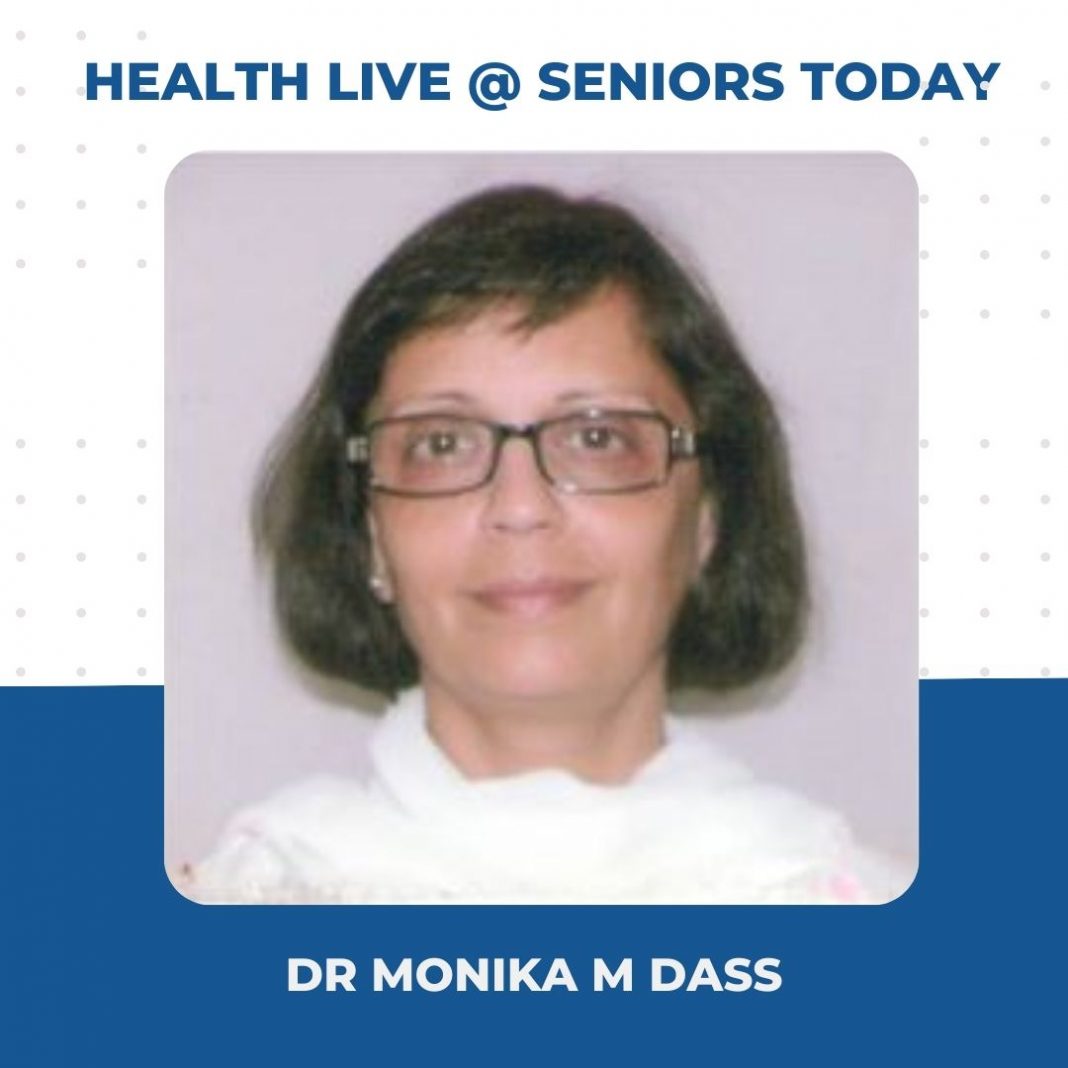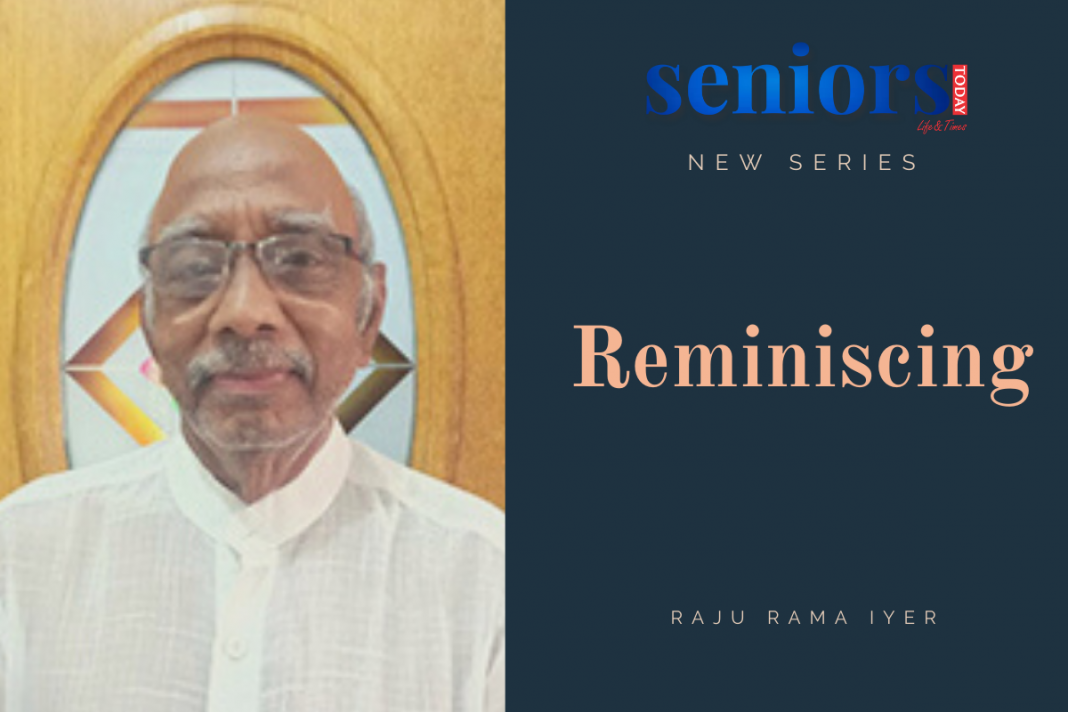On August 8, 2021, Seniors Today hosted a Health Live session with senior psychologist Dr Monika M Das to speak and answer questions on dealing with fear and anxiety given Covid-19. Capt Dr Noor Gill captures the takeaways
Dr Monika Dass is a Chartered Psychologist, a Chartered Scientist and an Associate Fellow of the British Psychological Society, UK. Professionally, she has counselled over 12,500 individuals in a span of 20 years and has published several papers in both Indian and international journals.
A trained pianist and vocalist from the Trinity College of Music, London, Dr Dass has influenced many lives with the joyful learning of music. She has been actively involved in several popular musicals such as The Sound of Music, Joseph and His Amazing Technicolour Dreamcoat and so on…with her expertise in developing children through drama. She firmly believes that any extracurricular activity can help tap into one’s potential and bring out the best in an individual.
Fear relates to something which is known, something which you understand as a threat. Whereas anxiety relates to something which is unknown and unexpected.
Fear is the result of a real threat whereas anxiety is the result of a perceived threat or anticipation of a future threat.
Fear and anxiety lead to expression of a range of adaptive and expressive behaviours and basically puts people under chronic stress that puts people under a threat of developing a mental illness in these times, particularly people who are over the age of 60-65 years and are alone at home.
What can I do to relieve stress, worry and fear during the Covid-19 pandemic?
Find ways to exercise. Staying active relieves your anxiety, reduces your stress and manages your moods. While gyms and group classes are out of the question, you can still cycle, go hiking, go on walks. If you’re in a city or place where you cannot go out, try looking for online videos and try joining classes on the internet.
What can I do to cope with the affects of the covid 19 quarantine?
Sedentary behaviour and low levels of activity can have a very negative impact on your health and quality of life.
Self-quarantine can also be particularly stressful for elderly people. Any type of physical and relaxing activity or technique can be helpful and are valuable tools.
WHO recommends 150 minutes of moderate to intensive activity or at least 75 minutes of vigorous activity per week.
What preventive measures can I take against the Corona virus?
We all know the basics-
Washing our hands regularly
Using an alcohol-based sanitiser or rub.
Maintaining social distance, earlier the recommended distance was 3 meters and it has now come down to 1-2 meters.
Avoid touching your face
Wearing a mask and covering you face every time you cough or sneeze
If you’re unwell, stay home
Smoking is a big no no, since it weakens your lungs
Practising physical distancing and avoiding unnecessary travel
Particularly for the elderly, try and stay away from large groups of people
What can I do on a daily basis to stay healthy during the Covid-19 pandemic?
A regular routine is a must. You have to sleep on time, you have to take your meals on time, and same goes for all the other activities you are normally involved with.
Don’t have late lunches or dinners.
Staying socially connected in these times is very important. Talking to your loved ones everyday or as often as you can is very important, this can be via phone calls or messaging or video calls.
Use this time to share your feelings and try out hobbies you and your friends enjoy.
When indulging in physical activities, please make sure that the exercises you’re performing are appropriate for your age and level of fitness, consult your doctor if you’re not sure.
Use household chores as a way to keep yourself physically active.
How long does it take to develop an adequate immune response after taking the Covid-19 vaccine?
It takes about 2-3 weeks after taking the second dose of the vaccine for an immune response to develop.
In what conditions does Covid-19 survive the longest?
The coronavirus dies very quickly when exposed to UV light or sunlight. Viruses such as SARS CoV2 survive on room temperatures or temperatures that are slightly lower than the room temperature. So places where the humidity levels are low
How long does Covid ]-19 virus last on various surfaces?
It lasts 72 hours on plastic
24 hours on cardboard
These viruses can last upto a long time and you need to be very careful when your handling bottles and things like that particularly when your go out.
Why are workouts important during these times?
Physical activity is extremely beneficial to both the body and mind. It is helpful in controlling diabetes and high blood pressure. Maintaining bone strength and muscle tone through exercise is important especially as regular outdoor activity is curtailed.
Exercise boosts your immunity and helps with mental health issues such as depression.
Walking is one of the best way to stay physically active.
Should alcohol be avoided after taking your Covid-19 vaccine?
Most experts say that there is no evidence of alcohol impairing the effectiveness of the vaccine. So you can take a drink or 2 after 3-4 days of receiving the vaccine. But be careful with it.
Does the virus grow in hot and humid climates?
So far, Covid-19 can transfer to all areas regardless of the climate. Take all protective measures while travelling, now that the flights are opening.
Passenger sitting and travelling via air, you should wear the full PPE kit.
Ways to manage anxiety in these times:
- Limit how often you check for updates. Just take in the information you require.
- Focus on things you can control. You can control your health, your physical well being, your diet, the people you talk to and meet
- Try to change the focus of your attention. You cannot control how severe the outbreak of the corona virus is in your city or town but you can take steps to reduce your own personal risk and the risk that you may pass onto others.
- Plan for what you can. It’s important to plan. Planning helps you become less anxious. Write down particular worries that make your anxious or may disrupt your day to day life.
Don’t get hung up on getting everything to be perfect because that is impossible. So focus on making a list and solving/ finding a solution to the things that you can solve.
Focus on concrete things that you can solve rather than getting hung up on scenarios that have not yet taken place.
Once you’ve all you options on paper, draw out your line or action and when you’re done with it, put that book aside and don’t look at it again.
Don’t go back to rewrite your action plans.
How do you keep Whatifs from spiralling?
Relinquish your desire for control. It is easier said than done. Learn to ground yourself. Here’s a breathing technique to help you with the same- sit up straight and bring your attention to your breath. Focus all your attention on the here and now, noticing the sights, sounds and smells you hear around and how it is affecting your body.
Emotions are contagious. Be careful who you’re using as your sounding board. Avoid discussions with people who are negative about it. You can have these conversations with people who are rational, level headed about it.
Focus on rational responses that irrational ones.
Practice patience with yourself and with others.
Anxiety is an emotion that tends to seek out confirmation. While at times it can be validating, it can also leave you feeling emotional and tense.
Acknowledge your emotions with understanding. And then turn your minds to other things.
If you wish to join the Seniors Today Health Mind Forum, please click on this link to join: https://chat.whatsapp.com/H4ncfPj61TWLl0OfGzdKON




